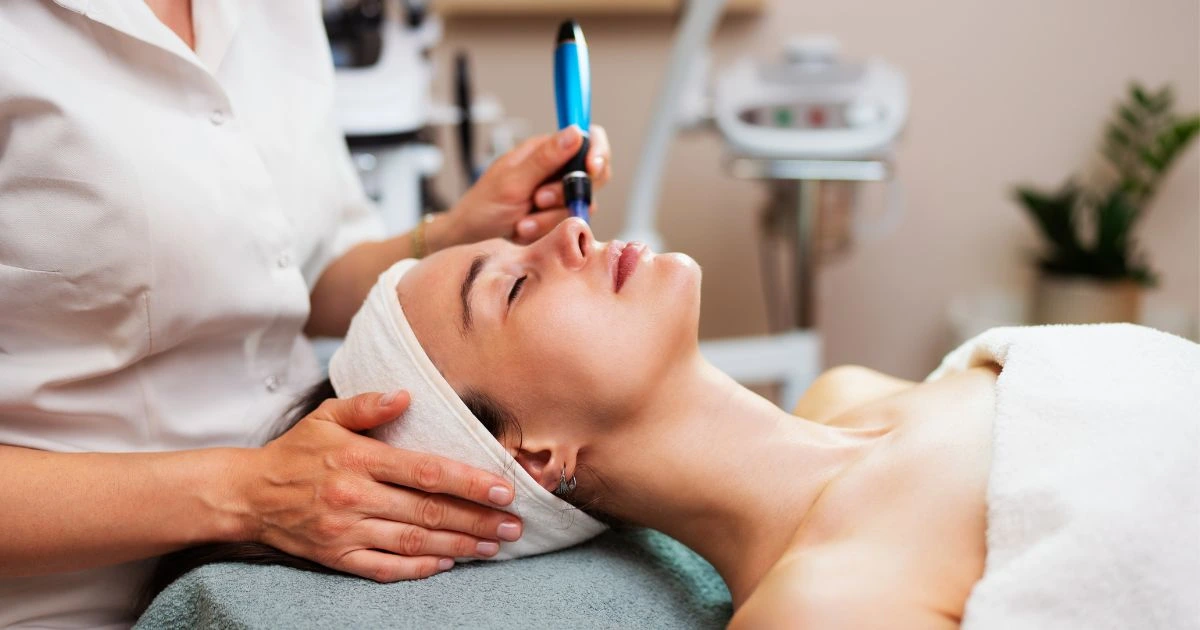Many aim to achieve radiant, youthful skin, and chemical peels provide an effective solution without invasive procedures. At Skin & Tonic, clients experience a unique wellness journey through chemical peel treatments. Applying a chemical solution exfoliates the skin, promoting new, healthier cells. As a result, the skin has a smoother texture and a more even tone, and signs of aging have diminished. We delve into the numerous benefits of chemical peels, the treatment process, and potential side effects, offering a comprehensive guide for anyone considering this transformative skincare option.
What Are Chemical Peels?
Chemical peels have become a popular treatment offering a variety of benefits for those looking to improve their skin’s appearance and health. Below, we will explore what chemical peels are, the types of peels available, how they work, their benefits, and potential side effects. Let’s dive into chemical peels and understand why they are a sought-after treatment.
- Definition of Chemical Peels: Chemical peels remove the skin’s top layers with a chemical solution, resulting in smoother, more youthful-looking skin. It addresses issues like wrinkles, discoloration, and scars.
- Types of Chemical Peels: Chemical peels vary in strength and depth of skin penetration. Superficial peels, also known as light peels, use mild acids like alpha-hydroxy acid to gently exfoliate the outer layer of skin, making them suitable for minor issues like slight discoloration and rough texture. Medium peels utilize trichloroacetic or glycolic acid to target the middle and outer layers of skin, effectively treating age spots, fine lines, and moderate discoloration. Deep peels employ more potent acids like phenol to penetrate the lower skin layers, addressing severe skin issues like deep wrinkles, scars, and precancerous growths.
- How Chemical Peels Work: A chemical peel treatment involves several key steps. First, a skin assessment is performed to determine the most suitable type of peel, and patients may need to follow a pre-peel regimen with topical creams or ointments. A chemical solution is delivered to the skin using a brush, sponge, or cotton applicator to create a controlled wound. The solution remains on the skin for a specified time based on the peel type, with superficial peels causing mild stinging and deeper peels potentially requiring pain relief. Healing is aided by specific skincare products and avoiding sun exposure after surgery. The peeling process duration varies, with light peeling lasting a few days and deeper peels taking several weeks for full recovery.
- Chemical Peel Side Effects: Chemical peels are relatively safe. However, some patients may encounter minor side effects such as mild redness and irritation, especially with superficial peels. These typically subside within a few hours to days.
What Are the Benefits of Chemical Peels?
Chemical peels offer various benefits for those seeking to improve the appearance and health of their skin. They can reveal smoother, clearer, and more youthful skin underneath. Below, we discuss the various benefits of chemical peels, providing a comprehensive guide for anyone considering this effective skincare treatment.
- Improved Skin Texture: Peels produce healthier skin by exfoliating dead skin cells and triggering new cell growth. This process smooths rough patches, making the skin feel softer and more even. Whether dealing with roughness due to sun damage or natural aging, a chemical peel treatment can leave your skin feeling rejuvenated and refreshed.
- Reduction of Fine Lines & Wrinkles: One of the most sought-after benefits of chemical peels is reducing fine lines and wrinkles. Chemical peels induce collagen production, which helps to plump the skin and minimize the formation of fine lines and wrinkles. It makes chemical peels an excellent noninvasive option for those looking to maintain a youthful appearance without resorting to surgical procedures.
- Even Skin Tone: Chemical peel treatments are highly effective in addressing uneven skin tone issues, such as hyperpigmentation, sunspots, and melasma. The peel’s exfoliating action helps to fade dark spots and promote a more uniform complexion. Over time, chemical peel treatments can lead to a more balanced and radiant skin tone.
- Acne and Acne Scar Treatment can particularly benefit individuals with acne-prone skin. The treatment helps to unclog pores, reduce inflammation, and decrease the frequency of acne breakouts. By inducing the production of collagen and skin cell turnover, chemical peels can also smooth out acne scars.
- Improved Skin Hydration: Chemical peels can improve skin hydration by removing dead skin cells, enhancing the skin’s ability to retain moisture, and culminating in a more hydrated, healthy-looking appearance.
- Enhanced Skincare Product Absorption: The skin is more receptive to skincare products after the post-chemical peel. It means that the active ingredients in your moisturizers, serums, and treatments can penetrate deeper into the skin, enhancing their effectiveness. As a result, you get more out of your skincare routine and see better results.
- Reduction of Pore Size: Chemical peels can help minimize the appearance of large pores. They can make pores appear smaller and less noticeable, leading to a smoother and more refined skin texture.
- Improved Radiance and Glow: One of the most immediate chemical peel benefits is improved skin radiance and glow. Removing dead skin cells reveals a fresher, brighter layer of skin underneath. This instant rejuvenation can give your complexion a healthy, youthful glow that is hard to achieve with other skincare treatments.
- Long-Lasting Results: Chemical peels can produce long-lasting results with proper aftercare and maintenance. Regular treatments can help maintain the improvements in skin texture, tone, and clarity, making chemical peels a crucial component of a long-term skincare regimen.
- Noninvasive Treatment: Chemical peels offer a noninvasive alternative to aggressive treatments like laser resurfacing or facelifts. They can be tailored to various skin types and concerns, making them versatile and accessible.
- Customizable Treatments: Chemical peels can be customized with different acids to target specific skin concerns, offering a tailored approach for each individual’s needs.
- Suitable for Various Skin Types: Chemical peels can be tailored for different skin types, including sensitive and darker skin tones. A licensed cosmetologist can assess your skin and recommend the appropriate peel to achieve the best results without irritation or adverse reactions.
- Prevention of Future Skin Issues: Regular chemical peel treatments can help prevent future skin issues. By promoting regular skin cell turnover and maintaining healthy skin, chemical peels can prevent the buildup of dead skin cells that can result in clogged pores, breakouts, and dullness.
Consult a Professional
Chemical peels offer many benefits, making them popular and effective skincare treatments. By understanding the benefits and how the treatment works, individuals can make informed decisions about incorporating this powerful skincare option into their routine. Consulting with a skincare professional is the first step towards achieving smoother, clearer, and more youthful-looking skin for those considering a chemical peel treatment. Consulting with a licensed cosmetologist will guide you toward the best treatment option.
Takeaway
Chemical peels offer a transformative solution for achieving smoother, clearer, and more youthful-looking skin. With benefits ranging from improved texture and even tone to reduced fine lines and acne scars, chemical peels can enhance your skin’s health and appearance. Ready to experience the benefits for yourself? Contact Skin & Tonic today to schedule a consultation or book your appointment. Our expert team is here to guide you through the process and help you achieve your skincare goals. Don’t wait—take the first step towards radiant skin now!




